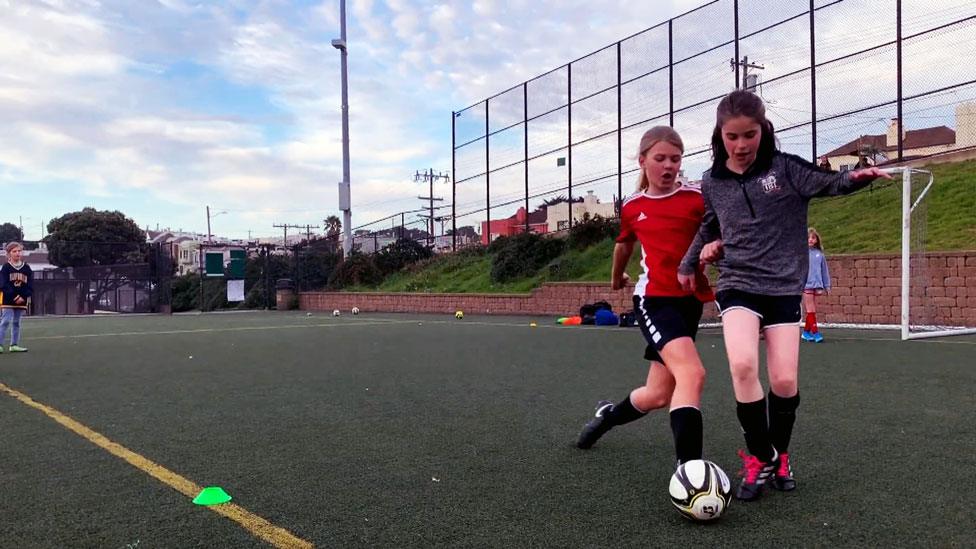Has a ban on heading the ball affected soccer in the US?
- Published
How health concerns changed football
As the Scottish football association announced a ban on children heading the ball, BBC Scotland's sports news correspondent Chris McLaughlin travelled to the US where similar rules have been in force since 2015.
In the sunset district of San Francisco, on a unseasonably warm February evening, Libby Rappolt leads the weekly soccer practice for the San Francisco Vikings.
The Vikings are a girls team with an age range of eight to 14 and they are going about their business with all the enthusiasm you would expect from a group of eager Californian youngsters.
But she tells me this season there's a change for what she calls her 2008 group. That's because this year, for the first time, this age group of girls will be allowed to head the ball.
"It's difficult because some are scared to head and some are simply told not to by their parents," she says.
The heading of the ball was banned in the US, for children aged 10 and under, after a lawsuit was filed against the US Soccer Federation by a group of concerned parents and players.
Some within the game believe the US were safeguard pioneers, leading the way after some worrying research around concussions.
Others have a different view - pointing out that it took the threat of legal action for moves to be made. Either way, the Americans were the first to impose the restrictions that others, including the Scottish FA, are now beginning to adopt.
The trend in the science is only going one way.
Nobody really knows why, but the links between football and degenerative brain disease is now unarguable.
What is up for debate is what the new restrictions will do to the game itself and how easy it will be to stop impressionable children trying to emulate their professional heroes.

Some girls are scared to head the ball and some are told not to by their parents.
Libby coached before and after the 2015 ban came into place and is fairly candid about the practical difficulties of saying no but also the balancing act of convincing some girls, when the time comes, that sometimes heading is ok.
"I grew up heading the ball and was told to be brave and throw my head into all kinds of situations - so now, to tell the players to duck because you'll be giving up a free kick, it's definitely a different way to coach the game.
"There's also a new psychological element to what I have to do now," she said.
"For those scared to head the ball, I teach them to chest it."
After practice is over, I gather a group of the girls to chat to them about the prospect of them heading the ball for the first time.
The head bands, braces and giggling does little to disguise an in depth knowledge of the subject that seems beyond their years.

Some of the young soccer players told Chris about their thoughts on heading the ball
Ten-year-old Lucy Jameson isn't keen.
"In a game, when you kick it really hard from a corner, it's scary because if the wrong part of your head hits it, then you could get a concussion."
Her team-mate, 11-year-old Phoebe Miller, has a different view.
"It will make me feel like a better soccer player because a lot of the professionals do it, so I really want to learn how to do it," she says.
These are the realities now facing a new generation of children and coaches in the UK.
For those who think the restrictions will ultimately change the game as we know it, Libby has this message.
"Most of the players that we have here are not going to be professional players, so preserving their long term health is the priority.
"We must keep a perspective," she says.
"The possibility of me training one of these kids to be in the national team is pretty slim but the fact that I'm going to be putting all these kids into the workforce and to be parents, they need their cognitive functioning and that's the most important thing."